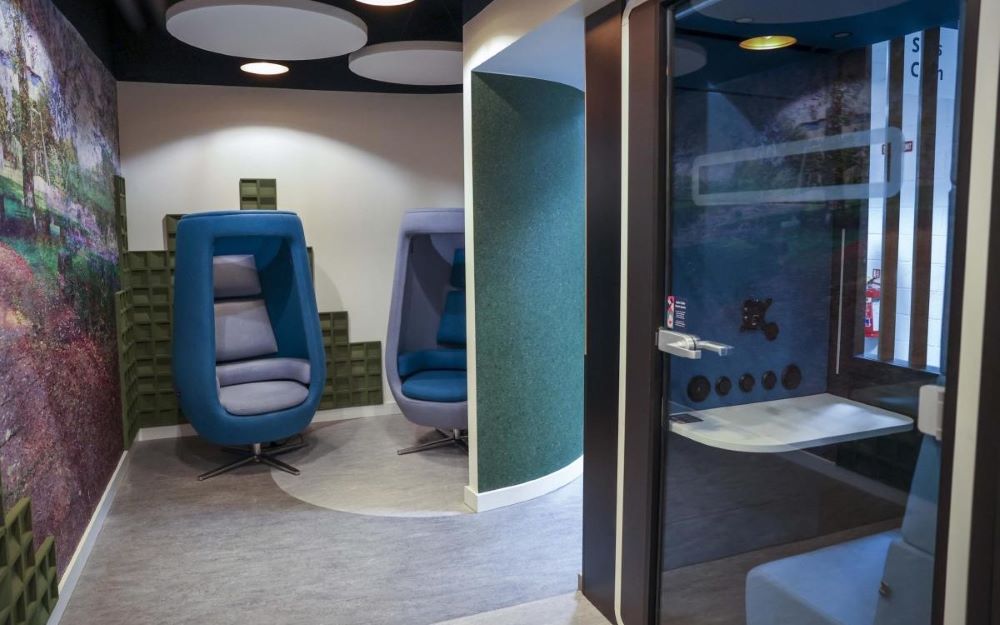Plans have been unveiled to make Dublin City University an even friendlier campus for autistic staff and students with the launch of a new Quiet Space in the Henry Grattan building on the university’s Glasnevin campus. Adam Harris, founder and CEO of AsIAm, joined DCU staff and students to launch the space, which was developed with support from UCB Community Health Fund and Codex Office Solutions.
The Quiet Space initiative is part of the DCU Autism-Friendly Project, which aims to support and celebrate students and staff who are on the autism spectrum. In January 2016, DCU launched the first phase of the project, implementing a series of initiatives to meet the identified needs of autistic staff and students. These projects included the development of an Autism toolkit for students, Autism-friendly open days, and the installation of three sensory pods. In 2018, DCU was designated the world’s first Autism-Friendly University.
In 2021, DCU launched the first ever Autism-Friendly University Design Guide, developed in collaboration with global expert Prof Magda Mostafa, a world leader in the field of architectural design. The guide was created through a year-long series of virtual engagements and workshops with key stakeholders, including staff, students, external organisations, advocacy groups and other key partners.
Students from DCU’s autistic community completed a sensory audit of the campus for the Design Guide, with findings showing a need for quiet, sensory-friendly spaces. The design of the new Quiet Space in the Henry Grattan building was led by the Guide’s findings and recommendations around acoustics, touch, wayfinding and lighting.

Ahead of the launch, DCU Autism Friendly University Coordinator Fiona Earley said:
“Quiet spaces are beneficial for everyone, but essential for many. Environmental factors like lighting, sound, smell and touch can be overwhelming, overloading the senses and causing stress, exhaustion and anxiety for autistic students and staff. This new space is designed to work as an escape hatch – a place to recover and recharge for our entire community of students and staff.”
The second phase of the DCU Autism-Friendly Project began this year, and will focus on building capacity to support autistic employees, and on piloting an indoor navigation app with a dashboard that informs users of current noise levels, location of noisy and quiet hotspots, and on the location of the new quiet zones on campus.
The development of the Henry Grattan Quiet Space was supported by the UCB Community Health Fund and Codex Office Solutions.
Speaking ahead of the launch, Claire Brading, the General Manager of UCB UK & Ireland said:
“We were pleased to support Dublin City University Education Trust with a grant from the UCB Community Health Fund in 2022 and even more delighted to see the project come to fruition today. It is wonderful to see the Quiet Space open as part of the university’s autism-friendly project and I hope the room provides the space needed for everyone to enjoy and make the most of their time on campus. Since the Fund launched in 2020, we have provided organisations in the UK and Ireland with almost €700,000 (€6.5m globally) to support those who are dedicated to helping vulnerable young people. We are proud to have a small role in the wonderful projects these organisations are delivering and the difference they are making to people’s lives.”
“Codex has been a proud sponsor of DCU’s Access to the Workplace programme since 2019 so we were delighted to take on the project of developing an autism-friendly ‘escape’ space here in the Henry Grattan Building,” said Kate Nelligan, Codex’s Head of Furniture and Interiors.
“This will give students access to a quiet space with a calming environment where they can remain fully engaged with their studies, instead of simply having to go home. We are seeing more and more demand for neurodivergent-friendly spaces, not only from the education sector but from large organisations in tech, finance and other sectors. It requires specialist knowledge and very specific furniture, textures and other products to create these spaces but they are so important in any building that strives to be truly inclusive. We hope the students of DCU get great use out of their new escape space.”
The Autism-Friendly University initiative is a key part of DCU’s commitment to pioneering an inclusive and transformative student experience and enabling all our students to thrive.